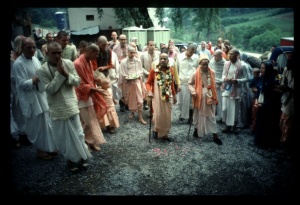SB 5.24.26: Difference between revisions
m (1 revision(s)) |
No edit summary |
||
| Line 1: | Line 1: | ||
{{info | {{info | ||
|speaker=King Bali | |speaker=King Bali | ||
|listener=King Bali speaking to himself | |listener=King Bali speaking to himself | ||
}} | }} | ||
[[Category:Srimad-Bhagavatam - Canto 05 Chapter 24]] | |||
[[Category:Bhagavatam Verses Spoken by Bali Maharaja - Vanisource|052426]] | |||
<div style="float:left">'''[[Srimad-Bhagavatam]] - [[SB 5|Fifth Canto]] - [[SB 5.24: The Subterranean Heavenly Planets|Chapter 24: The Subterranean Heavenly Planets]]'''</div> | |||
<div style="float:right">[[File:Go-previous.png|link=SB 5.24.25]] '''[[SB 5.24.25]] - [[SB 5.24.27]]''' [[File:Go-next.png|link=SB 5.24.27]]</div> | |||
{{RandomImage}} | |||
==== TEXT 26 ==== | ==== TEXT 26 ==== | ||
<div | <div class="verse"> | ||
tasya mahānubhāvasyānupatham amṛjita-kaṣāyaḥ ko vāsmad-vidhaḥ parihīṇa-bhagavad-anugraha upajigamiṣatīti | :tasya mahānubhāvasyānupatham amṛjita-kaṣāyaḥ ko | ||
:vāsmad-vidhaḥ parihīṇa-bhagavad-anugraha upajigamiṣatīti | |||
</div> | </div> | ||
| Line 13: | Line 20: | ||
==== SYNONYMS ==== | ==== SYNONYMS ==== | ||
<div | <div class="synonyms"> | ||
''tasya''—of Prahlāda Mahārāja; ''mahā-anubhāvasya''—who was an exalted devotee; ''anupatham''—the path; ''amṛjita-kaṣāyaḥ''—a person who is materially contaminated; ''kaḥ''—what; ''vā''—or; ''asmat-vidhaḥ''—like us; ''parihīṇa-bhagavat-anugrahaḥ''—being without the favor of the Supreme Personality of Godhead; ''upajigamiṣati''—desires to follow; ''iti''—thus. | |||
</div> | </div> | ||
| Line 20: | Line 27: | ||
==== TRANSLATION ==== | ==== TRANSLATION ==== | ||
<div | <div class="translation"> | ||
Bali Mahārāja said: Persons like us, who are still attached to material enjoyment, who are contaminated by the modes of material nature and who lack the mercy of the Supreme Personality of Godhead, cannot follow the supreme path of Prahlāda Mahārāja, the exalted devotee of the Lord. | Bali Mahārāja said: Persons like us, who are still attached to material enjoyment, who are contaminated by the modes of material nature and who lack the mercy of the Supreme Personality of Godhead, cannot follow the supreme path of Prahlāda Mahārāja, the exalted devotee of the Lord. | ||
</div> | </div> | ||
| Line 27: | Line 34: | ||
==== PURPORT ==== | ==== PURPORT ==== | ||
<div | <div class="purport"> | ||
It is said that for spiritual realization one must follow great personalities like Lord Brahmā, Devarṣi Nārada, Lord Śiva and Prahlāda Mahārāja. The path of bhakti is not at all difficult if we follow in the footsteps of previous ācāryas and authorities, but those who are too materially contaminated by the modes of material nature cannot follow them. Although Bali Mahārāja was actually following the path of his grandfather, because of his great humility he thought that he was not. It is characteristic of advanced Vaiṣṇavas following the principles of bhakti that they think themselves ordinary human beings. This is not an artificial exhibition of humility; a Vaiṣṇava sincerely thinks this way and therefore never admits his exalted position. | It is said that for spiritual realization one must follow great personalities like Lord Brahmā, Devarṣi Nārada, Lord Śiva and Prahlāda Mahārāja. The path of bhakti is not at all difficult if we follow in the footsteps of previous ''ācāryas'' and authorities, but those who are too materially contaminated by the modes of material nature cannot follow them. Although Bali Mahārāja was actually following the path of his grandfather, because of his great humility he thought that he was not. It is characteristic of advanced Vaiṣṇavas following the principles of bhakti that they think themselves ordinary human beings. This is not an artificial exhibition of humility; a Vaiṣṇava sincerely thinks this way and therefore never admits his exalted position. | ||
</div> | </div> | ||
__NOTOC__ | |||
<div style="float:right; clear:both;">[[File:Go-previous.png|link=SB 5.24.25]] '''[[SB 5.24.25]] - [[SB 5.24.27]]''' [[File:Go-next.png|link=SB 5.24.27]]</div> | |||
__NOTOC__ | |||
__NOEDITSECTION__ | |||
Revision as of 13:56, 3 June 2021

A.C. Bhaktivedanta Swami Prabhupada
TEXT 26
- tasya mahānubhāvasyānupatham amṛjita-kaṣāyaḥ ko
- vāsmad-vidhaḥ parihīṇa-bhagavad-anugraha upajigamiṣatīti
SYNONYMS
tasya—of Prahlāda Mahārāja; mahā-anubhāvasya—who was an exalted devotee; anupatham—the path; amṛjita-kaṣāyaḥ—a person who is materially contaminated; kaḥ—what; vā—or; asmat-vidhaḥ—like us; parihīṇa-bhagavat-anugrahaḥ—being without the favor of the Supreme Personality of Godhead; upajigamiṣati—desires to follow; iti—thus.
TRANSLATION
Bali Mahārāja said: Persons like us, who are still attached to material enjoyment, who are contaminated by the modes of material nature and who lack the mercy of the Supreme Personality of Godhead, cannot follow the supreme path of Prahlāda Mahārāja, the exalted devotee of the Lord.
PURPORT
It is said that for spiritual realization one must follow great personalities like Lord Brahmā, Devarṣi Nārada, Lord Śiva and Prahlāda Mahārāja. The path of bhakti is not at all difficult if we follow in the footsteps of previous ācāryas and authorities, but those who are too materially contaminated by the modes of material nature cannot follow them. Although Bali Mahārāja was actually following the path of his grandfather, because of his great humility he thought that he was not. It is characteristic of advanced Vaiṣṇavas following the principles of bhakti that they think themselves ordinary human beings. This is not an artificial exhibition of humility; a Vaiṣṇava sincerely thinks this way and therefore never admits his exalted position.